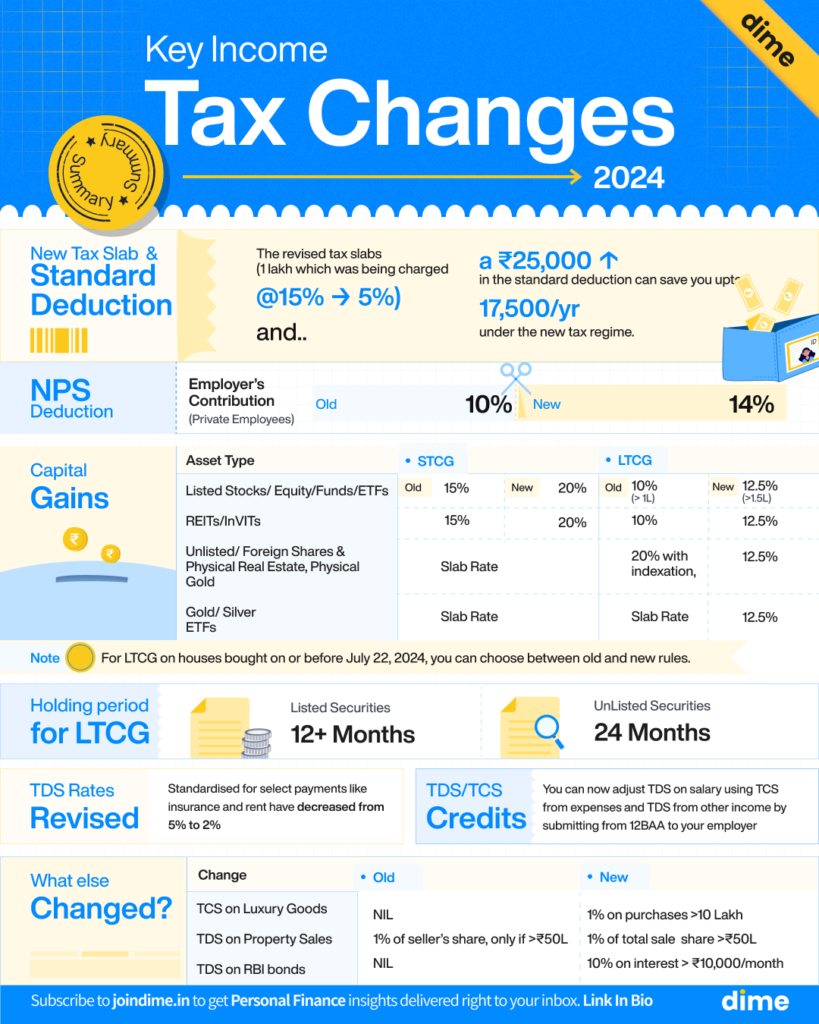Here’s a conversation tax advisors might not want you to listen to ( after all they are going to make money out of it 😝 ):

2024 brought significant changes to income tax rules, which will directly impact how you file your Income Tax Return (ITR) in 2025.
Here’s a detailed breakdown of the key changes and what it means for you:
New Income Tax Slabs
The income tax slabs under the New tax regime have changed. Here’s how:
| Income Range (Old) | Rate | Income Range (New) |
| 0 – 3,00,000 | – | 0 – 3,00,000 |
| 3,00,001 – 6,00,000 | 5% | 3,00,001 – 7,00,000 |
| 6,00,001 – 9,00,000 | 10% | 7,00,001 – 10,00,000 |
| 9,00,001 – 12,00,000 | 15% | 10,00,001 – 12,00,000 |
| 12,00,001 – 15,00,000 | 20% | 12,00,001 – 15,00,000 |
| 15,00,001 and above | 30% | 15,00,001 and above |
Basically, 1 Lakh which was being charged at 15% has been moved down to 5%.
Hike in Standard Deduction
The standard deduction limit under the new tax regime has increased from ₹50,000 to ₹75,000 for salaried individuals and from ₹15,000 to ₹25,000 for family pensioners.
This change reduces taxable income and benefits those opting for the new tax regime.
Note: There is no change in the standard deduction limit if an individual opts for the old tax regime

Higher Deduction for NPS Contributions
Employer contributions to the National Pension System (NPS) for Private employees are now deductible up to 14% of basic salary (earlier 10%), under the new tax regime.
Note: Besides the standard deduction, this is the only deduction you can claim under the new tax regime.
New Capital Gains Tax Rules
Capital Gains tax rules have been simplified to make it easier for you to calculate your income tax liability on capital gains.
Here’s how it has changed:
| Asset Type | STCG | LTCG | ||
| Listed Stocks/Equity Funds/ETFs | 15% | 20% | 10% (> ₹1 lakh) | 12.5% (>₹1.5 lakh) |
| REITs/InVITs | 15% | 20% | 10% (> ₹1 lakh) | 12.5% (>₹1.5 lakh) |
| Unlisted/Foreign Shares & Physical Real Estate,Physical Gold | Slab Rate | 20% with indexation | 12.5% (>₹1.5 lakh) | |
| Gold/Silver ETFs | Slab Rate | Slab Rate | 12.5% (>₹1.5 lakh) | |
Note: For LTCG on houses bought on or before July 22, 2024, you have the option to choose between old and new rules. However if sold on or before July 22, 2024, the old rule is mandatory.
Simplified Holding Periods for Capital Gains
Earlier, the rules for determining long-term or short-term capital gains varied across asset types. Now, it has been simplified:
| Holding Period For LTCG | |
| Listed Securities | 12+ months |
| Unlisted Securities | 24+ months |
This change makes it simpler to track holding periods and plan your investments effectively.
What changed in TDS and TCS?
This year saw many changes in the rules for TDS and TCS. Let’s have a look at them one by one:
A. New TDS Rates
The TDS rates have been standardised for certain payments.
Here’s how it looks now:
| Category | New TDS Rate |
| Commission Payments (Insurance, lottery ticket sales, brokerage) | 2% |
| Rent and Payments by Individuals/HUFs | 2% |
| Payment under insurance policy | 2% |
| E-commerce payments by operators | 0.1% |
| Payments for mutual fund/unit repurchase | Omitted |
B. Claiming TDS/TCS Credit
Suppose you buy a laptop worth ₹2 lakh, and 5% TCS of ₹10,000 is collected. Now you can claim this ₹10,000 to reduce TDS on your salary by using Form 12BAA.
Additionally, the government now allows TCS credit to be claimed by someone other than the collectee. For instance, parents paying tuition fees for their children studying abroad can claim TCS credits on the payment.
These changes can help you reduce TDS deductions, improve cash flow, and get more money in hand.
Note: The TCS credit rule will take effect from January 1, 2025.
C. What else changed?
| Change | Earlier Rule | New Rule | Impact |
| TCS on Luxury Goods | No TCS on luxury purchases | 1% TCS on purchases > ₹10 lakh (Jan 1, 2025) | Luxury purchases will cost more due to added TCS |
| TDS on Property Sales | Applied only if seller’s share > ₹50 lakh | Applies on total sale value > ₹50 lakh | Prevents tax evasion in high-value property deals |
| TDS on RBI Bonds | No TDS on interest from bonds | TDS on interest > ₹10,000/month (Oct 1, 2024) | Reduces upfront payouts but ensures tax compliance |
Altogether, these updated tax rules aim to streamline processes and bring clarity. Take your time to review these changes, plan your finances, and make informed decisions.

Summary
Refer the image below for the summary of the entire Read. Hope you enjoyed the Read!










